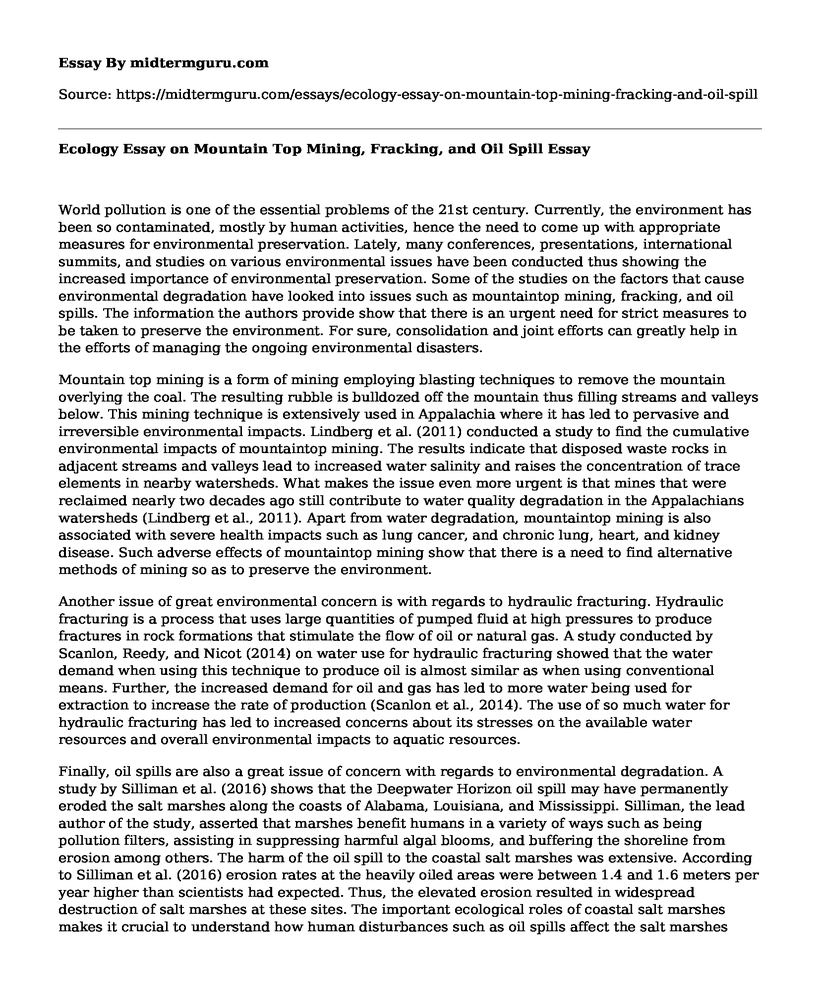World pollution is one of the essential problems of the 21st century. Currently, the environment has been so contaminated, mostly by human activities, hence the need to come up with appropriate measures for environmental preservation. Lately, many conferences, presentations, international summits, and studies on various environmental issues have been conducted thus showing the increased importance of environmental preservation. Some of the studies on the factors that cause environmental degradation have looked into issues such as mountaintop mining, fracking, and oil spills. The information the authors provide show that there is an urgent need for strict measures to be taken to preserve the environment. For sure, consolidation and joint efforts can greatly help in the efforts of managing the ongoing environmental disasters.
Mountain top mining is a form of mining employing blasting techniques to remove the mountain overlying the coal. The resulting rubble is bulldozed off the mountain thus filling streams and valleys below. This mining technique is extensively used in Appalachia where it has led to pervasive and irreversible environmental impacts. Lindberg et al. (2011) conducted a study to find the cumulative environmental impacts of mountaintop mining. The results indicate that disposed waste rocks in adjacent streams and valleys lead to increased water salinity and raises the concentration of trace elements in nearby watersheds. What makes the issue even more urgent is that mines that were reclaimed nearly two decades ago still contribute to water quality degradation in the Appalachians watersheds (Lindberg et al., 2011). Apart from water degradation, mountaintop mining is also associated with severe health impacts such as lung cancer, and chronic lung, heart, and kidney disease. Such adverse effects of mountaintop mining show that there is a need to find alternative methods of mining so as to preserve the environment.
Another issue of great environmental concern is with regards to hydraulic fracturing. Hydraulic fracturing is a process that uses large quantities of pumped fluid at high pressures to produce fractures in rock formations that stimulate the flow of oil or natural gas. A study conducted by Scanlon, Reedy, and Nicot (2014) on water use for hydraulic fracturing showed that the water demand when using this technique to produce oil is almost similar as when using conventional means. Further, the increased demand for oil and gas has led to more water being used for extraction to increase the rate of production (Scanlon et al., 2014). The use of so much water for hydraulic fracturing has led to increased concerns about its stresses on the available water resources and overall environmental impacts to aquatic resources.
Finally, oil spills are also a great issue of concern with regards to environmental degradation. A study by Silliman et al. (2016) shows that the Deepwater Horizon oil spill may have permanently eroded the salt marshes along the coasts of Alabama, Louisiana, and Mississippi. Silliman, the lead author of the study, asserted that marshes benefit humans in a variety of ways such as being pollution filters, assisting in suppressing harmful algal blooms, and buffering the shoreline from erosion among others. The harm of the oil spill to the coastal salt marshes was extensive. According to Silliman et al. (2016) erosion rates at the heavily oiled areas were between 1.4 and 1.6 meters per year higher than scientists had expected. Thus, the elevated erosion resulted in widespread destruction of salt marshes at these sites. The important ecological roles of coastal salt marshes makes it crucial to understand how human disturbances such as oil spills affect the salt marshes hence doing whatever possible to prevent such occurrences in the future.
In conclusion, mountaintop mining, hydraulic fracturing, and the Deepwater Horizon oil spill are among the major aspects of great concern with regards to environmental preservation in the United States. Mountain top mining has led to water degradation and severe health impacts to the mining population, hydraulic fracturing has put too much pressure on aquatic resources, and the Deepwater Horizon oil spill has led to the permanent erosion of some of the coastal salt marshes in the heavily oiled sites. The adverse impacts of human activities on the environment necessitates the need for consolidation and joint efforts to come up with measures to conserve the environment.
References
Lindberg, T. T., Bernhardt, E. S., Bier, R., Helton, A. M., Merola, R. B., Vengosh, A., & Di Giulio, R. T. (2011). Cumulative impacts of mountaintop mining on an Appalachian watershed. Proceedings of the National Academy of Sciences, 108(52), 20929-20934.
Scanlon, B. R., Reedy, R. C., & Nicot, J. P. (2014). Comparison of water use for hydraulic fracturing for unconventional oil and gas versus conventional oil. Environmental science & technology, 48(20), 12386-12393.
Silliman, B. R., Dixon, P. M., Wobus, C., He, Q., Daleo, P., Hughes, B. B., ... & Hester, M. W. (2016). Thresholds in marsh resilience to the Deepwater Horizon oil spill. Scientific Reports, 6.
Cite this page
Ecology Essay on Mountain Top Mining, Fracking, and Oil Spill. (2021, Jun 04). Retrieved from https://midtermguru.com/essays/ecology-essay-on-mountain-top-mining-fracking-and-oil-spill
If you are the original author of this essay and no longer wish to have it published on the midtermguru.com website, please click below to request its removal:
- Annotated Bibliography on Volkswagen Emissions Scandal
- Reflective Essay on Hurricane Judith
- Paper Example on Understanding Mitigation and Preparedness
- Paper Example on Lifestyle Practices That Pose a Risk to a Person's Wellbeing
- Research Paper on Dangers of Genetically Modified Foods
- Preparing for Disaster: Insurance and Management Plan - Essay Sample
- Animal Testing in Pharmacy - Essay Sample







